Aleksandra Piktus
Command A: An Enterprise-Ready Large Language Model
Apr 01, 2025



Abstract:In this report we describe the development of Command A, a powerful large language model purpose-built to excel at real-world enterprise use cases. Command A is an agent-optimised and multilingual-capable model, with support for 23 languages of global business, and a novel hybrid architecture balancing efficiency with top of the range performance. It offers best-in-class Retrieval Augmented Generation (RAG) capabilities with grounding and tool use to automate sophisticated business processes. These abilities are achieved through a decentralised training approach, including self-refinement algorithms and model merging techniques. We also include results for Command R7B which shares capability and architectural similarities to Command A. Weights for both models have been released for research purposes. This technical report details our original training pipeline and presents an extensive evaluation of our models across a suite of enterprise-relevant tasks and public benchmarks, demonstrating excellent performance and efficiency.
Aya Expanse: Combining Research Breakthroughs for a New Multilingual Frontier
Dec 05, 2024



Abstract:We introduce the Aya Expanse model family, a new generation of 8B and 32B parameter multilingual language models, aiming to address the critical challenge of developing highly performant multilingual models that match or surpass the capabilities of monolingual models. By leveraging several years of research at Cohere For AI and Cohere, including advancements in data arbitrage, multilingual preference training, and model merging, Aya Expanse sets a new state-of-the-art in multilingual performance. Our evaluations on the Arena-Hard-Auto dataset, translated into 23 languages, demonstrate that Aya Expanse 8B and 32B outperform leading open-weight models in their respective parameter classes, including Gemma 2, Qwen 2.5, and Llama 3.1, achieving up to a 76.6% win-rate. Notably, Aya Expanse 32B outperforms Llama 3.1 70B, a model with twice as many parameters, achieving a 54.0% win-rate. In this short technical report, we present extended evaluation results for the Aya Expanse model family and release their open-weights, together with a new multilingual evaluation dataset m-ArenaHard.
Replacing Judges with Juries: Evaluating LLM Generations with a Panel of Diverse Models
May 01, 2024



Abstract:As Large Language Models (LLMs) have become more advanced, they have outpaced our abilities to accurately evaluate their quality. Not only is finding data to adequately probe particular model properties difficult, but evaluating the correctness of a model's freeform generation alone is a challenge. To address this, many evaluations now rely on using LLMs themselves as judges to score the quality of outputs from other LLMs. Evaluations most commonly use a single large model like GPT4. While this method has grown in popularity, it is costly, has been shown to introduce intramodel bias, and in this work, we find that very large models are often unnecessary. We propose instead to evaluate models using a Panel of LLm evaluators (PoLL). Across three distinct judge settings and spanning six different datasets, we find that using a PoLL composed of a larger number of smaller models outperforms a single large judge, exhibits less intra-model bias due to its composition of disjoint model families, and does so while being over seven times less expensive.
FinGPT: Large Generative Models for a Small Language
Nov 03, 2023



Abstract:Large language models (LLMs) excel in many tasks in NLP and beyond, but most open models have very limited coverage of smaller languages and LLM work tends to focus on languages where nearly unlimited data is available for pretraining. In this work, we study the challenges of creating LLMs for Finnish, a language spoken by less than 0.1% of the world population. We compile an extensive dataset of Finnish combining web crawls, news, social media and eBooks. We pursue two approaches to pretrain models: 1) we train seven monolingual models from scratch (186M to 13B parameters) dubbed FinGPT, 2) we continue the pretraining of the multilingual BLOOM model on a mix of its original training data and Finnish, resulting in a 176 billion parameter model we call BLUUMI. For model evaluation, we introduce FIN-bench, a version of BIG-bench with Finnish tasks. We also assess other model qualities such as toxicity and bias. Our models and tools are openly available at https://turkunlp.org/gpt3-finnish.
GAIA Search: Hugging Face and Pyserini Interoperability for NLP Training Data Exploration
Jun 02, 2023Abstract:Noticing the urgent need to provide tools for fast and user-friendly qualitative analysis of large-scale textual corpora of the modern NLP, we propose to turn to the mature and well-tested methods from the domain of Information Retrieval (IR) - a research field with a long history of tackling TB-scale document collections. We discuss how Pyserini - a widely used toolkit for reproducible IR research can be integrated with the Hugging Face ecosystem of open-source AI libraries and artifacts. We leverage the existing functionalities of both platforms while proposing novel features further facilitating their integration. Our goal is to give NLP researchers tools that will allow them to develop retrieval-based instrumentation for their data analytics needs with ease and agility. We include a Jupyter Notebook-based walk through the core interoperability features, available on GitHub at https://github.com/huggingface/gaia. We then demonstrate how the ideas we present can be operationalized to create a powerful tool for qualitative data analysis in NLP. We present GAIA Search - a search engine built following previously laid out principles, giving access to four popular large-scale text collections. GAIA serves a dual purpose of illustrating the potential of methodologies we discuss but also as a standalone qualitative analysis tool that can be leveraged by NLP researchers aiming to understand datasets prior to using them in training. GAIA is hosted live on Hugging Face Spaces - https://huggingface.co/spaces/spacerini/gaia.
Scaling Data-Constrained Language Models
May 25, 2023Abstract:The current trend of scaling language models involves increasing both parameter count and training dataset size. Extrapolating this trend suggests that training dataset size may soon be limited by the amount of text data available on the internet. Motivated by this limit, we investigate scaling language models in data-constrained regimes. Specifically, we run a large set of experiments varying the extent of data repetition and compute budget, ranging up to 900 billion training tokens and 9 billion parameter models. We find that with constrained data for a fixed compute budget, training with up to 4 epochs of repeated data yields negligible changes to loss compared to having unique data. However, with more repetition, the value of adding compute eventually decays to zero. We propose and empirically validate a scaling law for compute optimality that accounts for the decreasing value of repeated tokens and excess parameters. Finally, we experiment with approaches mitigating data scarcity, including augmenting the training dataset with code data or removing commonly used filters. Models and datasets from our 400 training runs are publicly available at https://github.com/huggingface/datablations.
Spacerini: Plug-and-play Search Engines with Pyserini and Hugging Face
Feb 28, 2023Abstract:We present Spacerini, a modular framework for seamless building and deployment of interactive search applications, designed to facilitate the qualitative analysis of large scale research datasets. Spacerini integrates features from both the Pyserini toolkit and the Hugging Face ecosystem to ease the indexing text collections and deploy them as search engines for ad-hoc exploration and to make the retrieval of relevant data points quick and efficient. The user-friendly interface enables searching through massive datasets in a no-code fashion, making Spacerini broadly accessible to anyone looking to qualitatively audit their text collections. This is useful both to IR~researchers aiming to demonstrate the capabilities of their indexes in a simple and interactive way, and to NLP~researchers looking to better understand and audit the failure modes of large language models. The framework is open source and available on GitHub: https://github.com/castorini/hf-spacerini, and includes utilities to load, pre-process, index, and deploy local and web search applications. A portfolio of applications created with Spacerini for a multitude of use cases can be found by visiting https://hf.co/spacerini.
The ROOTS Search Tool: Data Transparency for LLMs
Feb 27, 2023


Abstract:ROOTS is a 1.6TB multilingual text corpus developed for the training of BLOOM, currently the largest language model explicitly accompanied by commensurate data governance efforts. In continuation of these efforts, we present the ROOTS Search Tool: a search engine over the entire ROOTS corpus offering both fuzzy and exact search capabilities. ROOTS is the largest corpus to date that can be investigated this way. The ROOTS Search Tool is open-sourced and available on Hugging Face Spaces. We describe our implementation and the possible use cases of our tool.
Evaluate & Evaluation on the Hub: Better Best Practices for Data and Model Measurements
Oct 06, 2022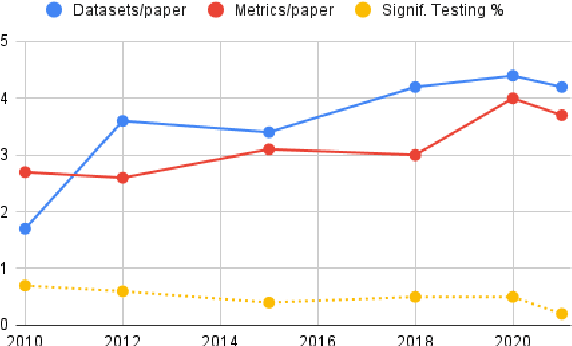
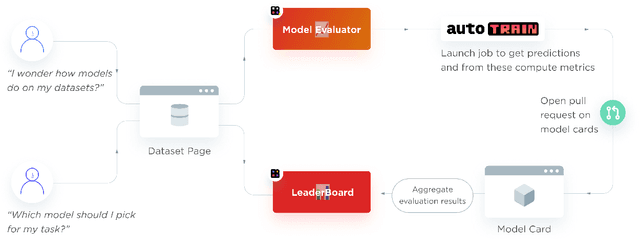
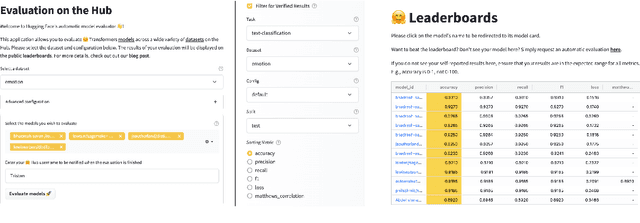
Abstract:Evaluation is a key part of machine learning (ML), yet there is a lack of support and tooling to enable its informed and systematic practice. We introduce Evaluate and Evaluation on the Hub --a set of tools to facilitate the evaluation of models and datasets in ML. Evaluate is a library to support best practices for measurements, metrics, and comparisons of data and models. Its goal is to support reproducibility of evaluation, centralize and document the evaluation process, and broaden evaluation to cover more facets of model performance. It includes over 50 efficient canonical implementations for a variety of domains and scenarios, interactive documentation, and the ability to easily share implementations and outcomes. The library is available at https://github.com/huggingface/evaluate. In addition, we introduce Evaluation on the Hub, a platform that enables the large-scale evaluation of over 75,000 models and 11,000 datasets on the Hugging Face Hub, for free, at the click of a button. Evaluation on the Hub is available at https://huggingface.co/autoevaluate.
Improving Wikipedia Verifiability with AI
Jul 08, 2022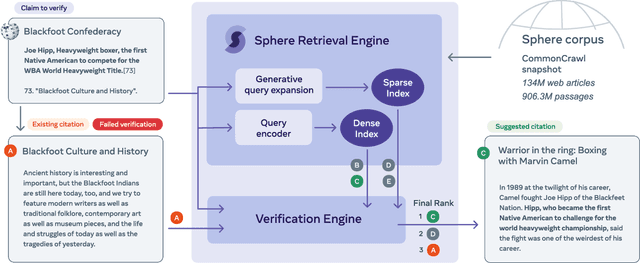

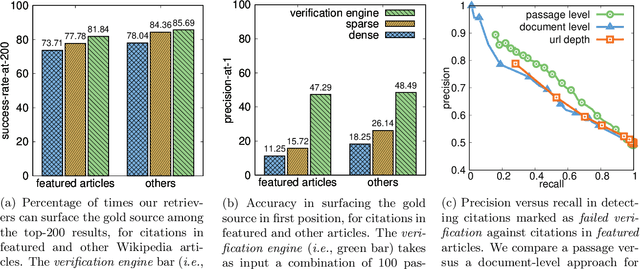
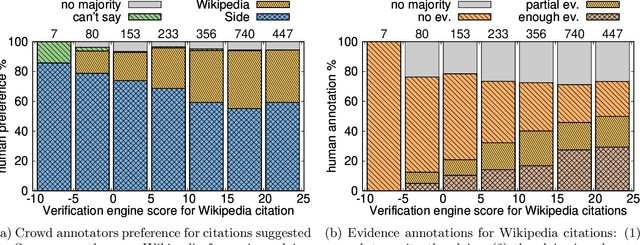
Abstract:Verifiability is a core content policy of Wikipedia: claims that are likely to be challenged need to be backed by citations. There are millions of articles available online and thousands of new articles are released each month. For this reason, finding relevant sources is a difficult task: many claims do not have any references that support them. Furthermore, even existing citations might not support a given claim or become obsolete once the original source is updated or deleted. Hence, maintaining and improving the quality of Wikipedia references is an important challenge and there is a pressing need for better tools to assist humans in this effort. Here, we show that the process of improving references can be tackled with the help of artificial intelligence (AI). We develop a neural network based system, called Side, to identify Wikipedia citations that are unlikely to support their claims, and subsequently recommend better ones from the web. We train this model on existing Wikipedia references, therefore learning from the contributions and combined wisdom of thousands of Wikipedia editors. Using crowd-sourcing, we observe that for the top 10% most likely citations to be tagged as unverifiable by our system, humans prefer our system's suggested alternatives compared to the originally cited reference 70% of the time. To validate the applicability of our system, we built a demo to engage with the English-speaking Wikipedia community and find that Side's first citation recommendation collects over 60% more preferences than existing Wikipedia citations for the same top 10% most likely unverifiable claims according to Side. Our results indicate that an AI-based system could be used, in tandem with humans, to improve the verifiability of Wikipedia. More generally, we hope that our work can be used to assist fact checking efforts and increase the general trustworthiness of information online.
 Add to Chrome
Add to Chrome Add to Firefox
Add to Firefox Add to Edge
Add to Edge